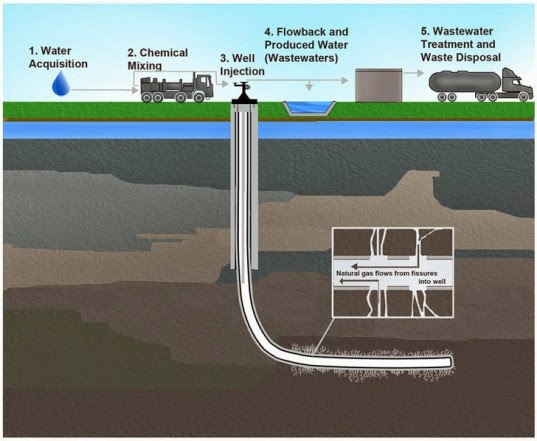Is Fracking Ethical?
Fracking has become an energy extraction success story in the United States in the past decade. Exploitation of natural gas and oil deposits has increased dramatically, thanks to the process of fracking, and many politicians and energy boosters now claim that the US will soon be "energy independent" and thus immune to outside pressures from OPEC and other energy monopolies.The Russian invasion of Crimea has been met with demands to export natural gas that is supposedly in large supply to European nations that are dependent on Russian natural gas deliveries.
But is fracking really a success story? Is it really the greatest means of developing carbon based energy? Are there "externalities" that have to be considered? Is this process moral and ethical? Will we be paying far too great a cost for such short term gains? Green Planet Films' The Ethics of Fracking(2014), takes on these issues, and does so in an activist fashion that eschews the false dichotomy of "balanced reporting". The film defines the concepts of ethics and morality and does so by interviewing 6 individuals who all have serious disagreements with the supposed benefits that this new energy extraction system promises.
And it isn't as if the energy industry hasn't started to admit in a variety of ways the destructive nature of this process. It just does so in an oblique fashion. Three quick examples will illuminate the energy industry's new concern with the potential destructive effects of fracking. The first was the response of Exxon/Mobil's CEO, Rex Tillerson, to the building of an enormous water tower near his Texas mansion hideaway. Tillerson threatened to go to court to stop the tower's construction, complaining that it would destroy both the value of his property and the peace and comfort of his homestead. Water towers attract trucks, in large numbers, to collect million of gallons of water to be delivered to well sites, 24 hours a day, 7 days a week. It might be good for the citizens of Ohio, to watch their home lives disrupted by broken roads, noise, dust and endless lines of trucks. But it wouldn't do for the man who both touts the success of fracking and the price we must all pay for cheap energy.
The second also comes from Exxon/Mobil, who, according to an April 5th article in the Wall Street Journal, written by Daniel Gilbert, "agreed to publicly disclose more details on the risks of hydraulic fracturing of oil and gas wells, reversing a long-held opposition after negotiations with environmental groups and investors." It appears that 50% of Americans now oppose fracking and major energy companies are now faced with having to reveal the nature of their drilling processes if they don't want to lose a major source of income production in the coming years. Stay tuned till September for any information to be revealed.
The third sample comes from an excerpted section(WSJ's April 6th issue) from Russell Gold's upcoming work on the fracking industry, "The Boom:How Fracking Ignited The American Energy Revolution and Changed the World." Gold, who is one of the Wall Street Journal's energy industry reporters, is willing to concede that safe practices have not been of concern to the industry in their headlong pursuit of production. He outlines three areas of concern that he feels should be mitigated, thus admitting to the destructive practices that have been going on without any concern to people or the environment. Gold points out that destruction of air, water and the health of the populace could easily be changed if appropriate industrial practices were employed. But by exposing these problems, he also admits that they exist, thus supporting the ideas brought forth in The Ethics of Fracking, that these processes have been destructive, unethical and immoral.
This new 36 minute documentary takes a simple talking heads strategy, accompanied by footage of the enormous destructive presence of trucks, pipelines, drilling stations, pumping stations and other processes that produce and deliver natural gas and oil to refineries all over the country. The six people interviewed include a Pennsylvania congressman (Matt Cartwright), an environmental engineering professor (Dr. Marleen Troy), an MD specializing in Nephrology (Dr. Alfonso Rodriquez), a rabbi, a priest and a philosophy professor. Each individual challenges the energy industries positive spin on the endless benefits of this new production process. They all define their positions with well defined concepts of ethics and morality and ask whether or not the companies responsible for these production processes are doing the same.
Groundwater pollution, methane releases, air pollution, noise and light pollution are all examined for their effects on human and non-human life. Are social, environmental and ecological effects the concern of profit making companies? The six people believe that corporations must be held accountable and lay out evidence for the negative effects of an industrial process that has run wild over the land and the people of affected states that contain enormous shale gas and oil deposits. The film makes legitimate arguments that it's not all blue sky and good times for all who are surrounded by the fracking industry. Compromised water, air, and health standards is not a small price to pay for energy success. It is an enormous cost that will have an impact on the populace well after the extraction process ends and the wells go silent. By asking if this industrial process and can stand ethical and moral challenges, The Ethics of Fracking, expands the arguments that are growing daily across the country about this industrial practice.







No comments:
Post a Comment